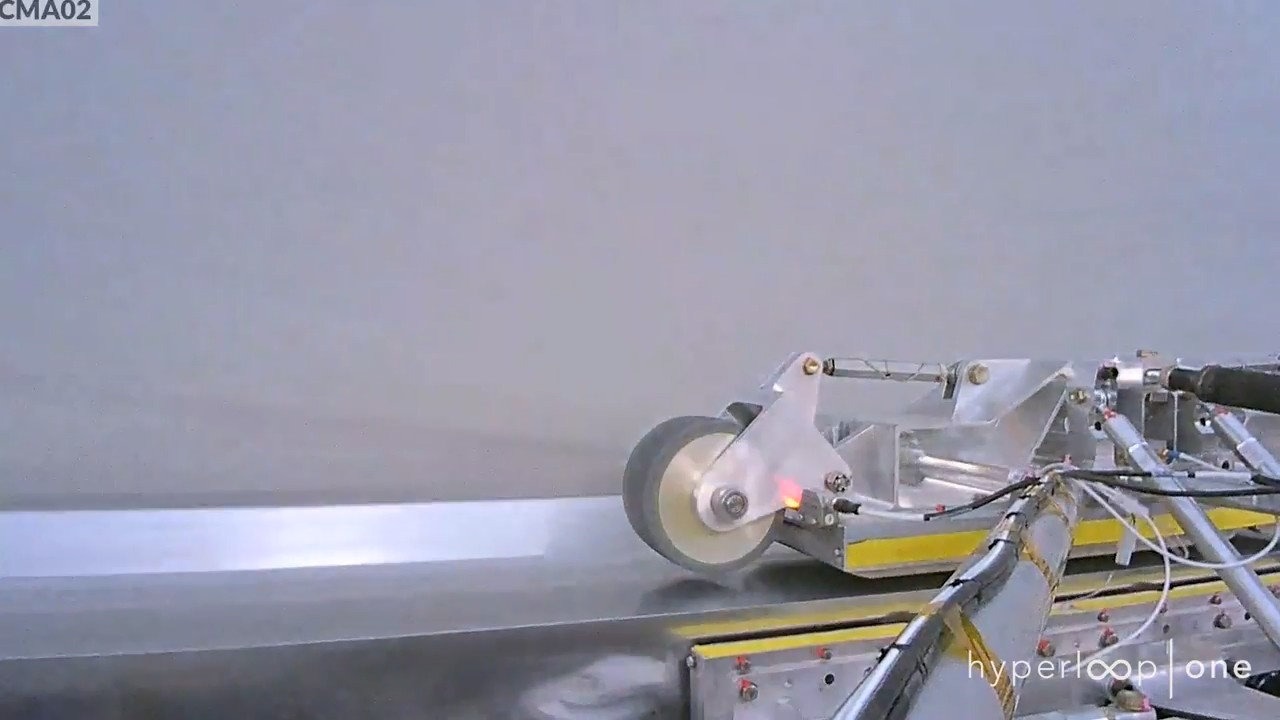Capsule Hyperloop One accelerates to 310 km / h

Hyperloop One has announced the successful trials of a demonstration capsule. In a DevLoop test tunnel of 500 m length near Las Vegas, the capsule developed a speed of 310 km / h. XP-1 capsule 8.7 m long is a carbon fiber shell on the chassis, which is levitated in a technical vacuum.
Of the 500 m tunnel, about 300 m are equipped with a linear electric motor with a wound winding, which creates a magnetic field. In the interaction of a moving secondary element with a permanent magnet with a stator - a series of induction coils - linear movement of the moving part of the engine, that is, magnetic levitation (maglev), is provided.
The first tests of the levitating chassis in the same tunnel took place on May 12, 2017 . The sparse atmosphere and the linear electric motor at 300 meters allow the capsule to accelerate to a maximum speed of 400 km / h, but the duration of the first test was 5.3 seconds and only 30 meters of the linear electric motor were involved, so that the chassis accelerated only to 112 km / h with an acceleration of 2G .

After that, a group of engineers accelerated the chassis faster and faster, and then began to test the capsule (carbon fiber shell on the chassis). Testing of the capsule is not fundamentally different from testing the chassis, because the carbon fiber shell has a very small weight, and the air resistance is almost absent. Therefore, in just a few days of testing on July 29, 2017, the XP-1 accelerated to a record speed of 310 km / h. This is close to the theoretical maximum that the DevLoop tunnel allows.
As in the previous time, after the air was pumped out, the pressure in the tunnel was 5 Pa, which corresponds to the technical vacuum.
For overclocking, we had to use all 300 m of the canvas with a stator. The stopping distance was then 137 m. According to Hyperloop One, with an additional 2000 m of cloth with a stator, the capsule could accelerate to 1,100 km / h.
“When you watch these videos, you hear the sound of Hyperloop. This is the sound of the public transport of the future, ”they pathetically write in a press release (in fact, the sound itself is at 0:52).
Maybe, even during our life, they will start building tunnels everywhere, where capsules fly at a speed of 1100 km / h along popular routes. In theory, this should be much cheaper than air transport. And the creators say that it is also safer. However, like everything new, at first people will be afraid of unusual technology. But over time, they will probably get used to it. In extreme cases, at first, the tunnels can be used to transport goods, especially since inhumane accelerations can be used, that is, the speed of cargo delivery will be higher than the speed of delivery of living passengers.
By setting a speed record, Hyperloop One proved that among all the companies that develop Hyperloop technology, it came closest to the commercial launch of this technology.
Executive Director Rob Lloyd (Rob Lloyd) said in a published statement: "We have proven the technology's performance and are now ready to enter into negotiations with partners, customers and governments around the world and the full commercialization of our Hyperloop technology." Previously, the company received investments including from the Office of Highway and Transportation in Dubai, the French National Railway System SNCF, venture capital funds GE Ventures and Western Technology Investment. A total of $ 160 million was raised.
Initially, Hyperloop One promised to conduct full-scale tests before the end of 2016. As you can see, the company turned out to be a bit optimistic and made a mistake for half a year. But now she is ready to start building the first real commercial / test tunnel. According to the company's management, the launch of such a tunnel will take place "within a few years." Previously called the year 2021.
Most likely, the first real transport tunnel will be built not in the USA (at least, the company’s management was against this option). At the beginning of this year, the company published a list of cities around the world that are competing to build the first experimental tunnel. The company Hyperloop One holds a contest among all comers. In January, 35 semifinalists were selected from 2,600 participants.
Interestingly, the author of the Hyperloop idea, Ilon Musk, who initially gave the technology to the public domain and now has no relation to it, can nevertheless meet his brainchild again. After all, his new company The Boring Company is engaged in just a quick laying of underground tunnels of small diameter. That is, they are like Hyperloop made for each other.
All Articles